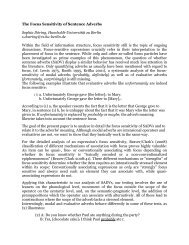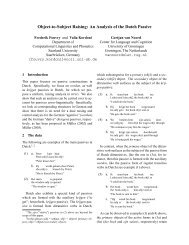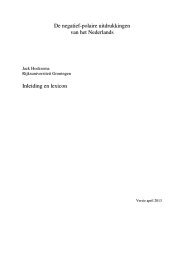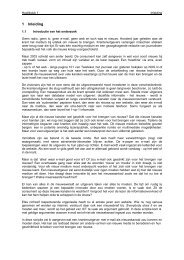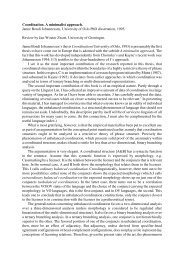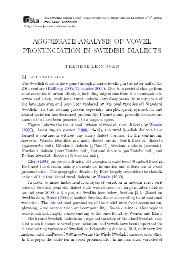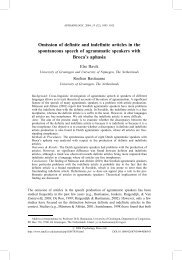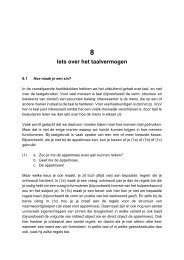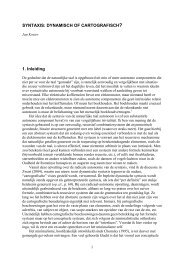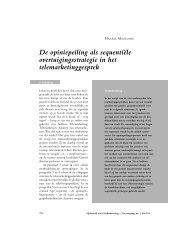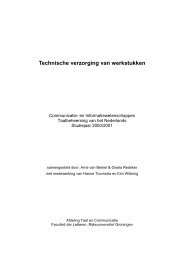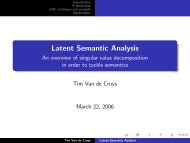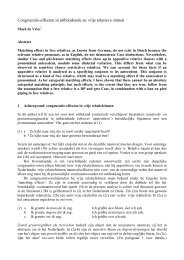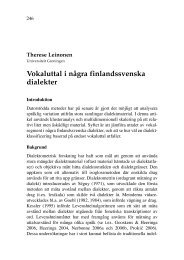VICI 2003 detailed proposal - Faculteit der Letteren
VICI 2003 detailed proposal - Faculteit der Letteren
VICI 2003 detailed proposal - Faculteit der Letteren
You also want an ePaper? Increase the reach of your titles
YUMPU automatically turns print PDFs into web optimized ePapers that Google loves.
Personal details<br />
Curriculum vitae Charlotte Gooskens<br />
Title, name: dr. Charlotte Gooskens<br />
Date and place of birth: 10 October 1962, Denmark<br />
Nationality: Danish<br />
Civil status: Married, 3 children<br />
Address: University of Groningen<br />
Center for Language and Cognition Groningen<br />
PO Box 716<br />
9700 AS Groningen<br />
Telephone: 050-3635827<br />
Cell phone: 06-31304956<br />
Fax: 050-3635821<br />
E-mail: c.s.gooskens@rug.nl<br />
Website: http://www.let.rug.nl/gooskens<br />
Education<br />
Doctorate<br />
University: University of Nijmegen<br />
Starting date: 1 September 1992<br />
Completion data: 28 November 1997<br />
Supervisor: Prof.dr. A.M. Hagen and dr. Renée van<br />
Bezooijen (co-promotor)<br />
Title of thesis: On the role of prosodic and verbal information<br />
in the perception of Dutch and English<br />
language varieties<br />
Master<br />
University: Leiden University<br />
Date: 19 June 1992<br />
Studies: General linguistics, Finnish, Turkish, Japanese<br />
Main subjects: General linguistics, phonetics<br />
Title of thesis: Contrastief on<strong>der</strong>zoek naar intonatie en<br />
Intonatiemodellen [contrastive investigation of<br />
intonation and models of intonation]<br />
Work experience since completing PhD<br />
2006 – now<br />
1999 – 2006<br />
1998 – 1999<br />
Associate professor (UHD) in Scandinavian linguistics, University<br />
of Groningen, permanent position<br />
Assistant professor in Scandinavian linguistics, University of<br />
Groningen, permanent position.<br />
Database administrator, University Hospital of Nijmegen, permanent<br />
position.<br />
1
Positions offered<br />
2011 Professorship of Scandinavian Linguistics, University of Kiel<br />
Brief summary of research over the last five years<br />
My research over the past years has focused on two main subjects:<br />
1. Objective and subjective quantitative measurements of linguistic<br />
differences between dialects and languages.<br />
2. Communicative aspects of language variation.<br />
These two interests were united in my NWO VIDI-project Linguistic determinants of<br />
mutual intelligibility in Scandinavia. I used newly developed methods for measuring<br />
linguistic distances computationally and refined them to be able to measure<br />
communicatively relevant linguistic distances among spoken languages. A model was<br />
developed of receptive multilingualism in Scandinavia. This model is based on the<br />
observation that some languages are so closely related that the speakers are able to<br />
communicate successfully each using their own language. Receptive multilingualism is<br />
widely used among speakers of the three mainland Scandinavian languages but has<br />
received less attention outside of Scandinavia.<br />
In my present NWO Free Competition project Mutual intelligibility of closely<br />
related languages in Europe: linguistic and non-linguistic determinants the model<br />
will be applied to other Germanic languages and to Slavic and Romance languages. This<br />
will increase our general un<strong>der</strong>standing of the role of linguistic distances in the mutual<br />
intelligibility of closely related languages. It is also an aim of the project to investigate<br />
how well speakers of closely related languages can communicate each using their own<br />
languages (receptive multilingualism) compared to communications by means of English<br />
as a lingua franca.<br />
At the moment I am piloting an investigation set up to develop web-based didactic<br />
programmes that will enable speakers of closely related languages to learn to<br />
communicate by means of receptive multilingualism. The programme is based on insight<br />
from my VIDI-project and the Free Competition project.<br />
Attitudes towards a language and its speakers play an important role in<br />
communication. I have carried out a number of experiments to investigate the link<br />
between language attitudes and intelligibility. My findings motivated me to plan an<br />
investigation which will experimentally examine the role and universality of various<br />
linguistic factors in the aesthetic evaluation of spoken languages.<br />
For information about my projects see http://www.let.rug.nl/gooskens/project/.<br />
Grants, scholarships and prizes<br />
2012<br />
2010<br />
HERA (Humanities in the European Research Area): Cultural Encounters –<br />
Matchmaking Event: €350,-, resulting in a research <strong>proposal</strong> with coapplicants<br />
prof.dr. Inger Lindberg, Sebastian Kürschner and Peter Juel<br />
Henrichsen Didactic approaches to receptive multilingualism. We were<br />
invited to submit a full <strong>proposal</strong> and are currently waiting for the decision.<br />
NWO (The Netherlands Organisation for Scientific Research): Free<br />
Competition, grant number PR-10-55: € 1.000.000,-. Mutual<br />
intelligibility of closely related languages in Europe: linguistic and nonlinguistic<br />
determinants, 2011-2015. Co-applicant: prof.dr. Vincent J. van<br />
Heuven. Project members: dr. Anja Schüppert (postdoc), dr. Wilbert<br />
Heeringa (postdoc), MA Jelena Golubovic (PhD student), Femke Swarte<br />
(PhD student), Stefanie Voigt (PhD student) and student assistants.<br />
2
2010<br />
2006 – 2010<br />
2007 – 2010<br />
2007<br />
<strong>2003</strong> – 2005<br />
<strong>2003</strong> – 2005<br />
1982 – 1985<br />
International activities<br />
2012 - now<br />
2012 - now<br />
CLARIN (Common Language and Resources and Technology<br />
Infrastructure): € 56.867,-. Assaying differences via edit-distance of<br />
pronunciation transcriptions. During this project a web application<br />
(Gabmap, see http://www.gabmap.nl/) was developed capable of<br />
measuring the differences in sets of phonetic transcriptions via edit<br />
distance. I was coordinator of this project.<br />
NWO (The Netherlands Organisation for Scientific Research): VIDI, grant<br />
number 276-75-005: € 600.000,-. Linguistic determinants of mutual<br />
intelligibility in Scandinavia. Project members: MA. Anja Schüppert (PhD<br />
student), dr. Renée van Bezooijen (postdoc), dr. Sebastian Kürschner<br />
(postdoc), dr. Nanna Haug Hilton (postdoc) and a number of student<br />
assistants.<br />
NWO/FWO: VNC (Vlaams-Ne<strong>der</strong>landse Comité), grant number 205-41-<br />
222: € 360.000,-. De on<strong>der</strong>linge verstaanbaarheid van taalvariëteiten in de<br />
Lage Landen: linguïstische en attitudinele determinanten [Mutual<br />
intelligibility of language varieties in the Low Countries: linguistic and<br />
attitudinal determinants]. Official applicants: prof.dr. Roeland van Hout<br />
(Radboud University Nijmegen), prof.dr. John Nerbonne (University of<br />
Groningen), prof.dr. Dirk Geeraerts (University of Leuven). The application<br />
was written on my initiatieve and I was the project lea<strong>der</strong> in Groningen.<br />
The Danish national bank: € 10.000,-. Funding of my stay as a guest<br />
researcher at Center for language change in real time at the University of<br />
Copenhagen.<br />
Gratama fonds: € 13.800,- . Linguistic and extra-linguistic predictors for<br />
inter-Nordic communication, carried out in cooperation with Scandinavian<br />
researchers from the project Internordisk sprogforståelse i en tid med øget<br />
internationalisering [Inter-Nordic intelligibility in times of increasing<br />
internationalisation], supported by the Nordic Cultural Fund.<br />
I was awarded 0.4 fte extra research time as part of a career program<br />
for female assistant professors within the faculty of arts at the University<br />
of Groningen (kwalificatietraject voor vrouwelijke UD’s).<br />
Scholarships for Finnish languages studies in Turku (one month) and<br />
Tampere (one month), and for Turkish language studies in Istanbul (four<br />
months).<br />
Member of AcademiaNet, a data base of renowned professors and<br />
distinguished researchers, see www.academia-net.org.<br />
Member of network Lingua Nordica (supported by the Nordic Cultural<br />
Fund), together with Auður Hauksdóttir and Birna Arnbjörnsdóttir<br />
(University of Reykjavik), Anna Mauranen (University of Helsinki), Ulla<br />
Börestam (University of Uppsala), Jens Allwood (University of<br />
Gothenburg), Gunnstein Akselberg (University of Bergen) and Karen<br />
Lund (University of Aarhus).<br />
3
2012<br />
2009 – now<br />
2009 – now<br />
2009 – now<br />
2007 – now<br />
2007 – 2010<br />
2005 – 2010<br />
2007 – 2009<br />
2007<br />
<strong>2003</strong> – 2006<br />
Together with Peter Juel Henrichsen from Copenhagen Business<br />
School and Inger Lindberg from the University of Stockholm joint<br />
outline <strong>proposal</strong> for HERA Joint Research Programme ‘Cultural Encounters’<br />
about Didactic approaches to receptive multilingualism (now invited to<br />
submit a full <strong>proposal</strong>).<br />
Collaboration with prof.dr. Sebastian Kürschner from of Friedrich-<br />
Alexan<strong>der</strong>-Universität Erlangen-Nürnberg. Joint research and<br />
publications. Organisation of the workshop Mutual intelligibility of closely<br />
related languages in a multilingual Europe during Sociolinguistics<br />
Symposium 19 in Berlin.<br />
Collaboration with prof.dr. Raphael Berthele from University of<br />
Fribourg. Exchange of research ideas and organisation of the workshop<br />
Receptive multilingualism: quantitative approaches during the 7th<br />
International symposium on bilingualism (ISB7) in Utrecht.<br />
Collaboration with researchers from Charles University in Prague (dr.<br />
Marian Sloboda, dr. Mira Nábělková and prof.dr. Jiří Nekvapil) within<br />
the project Distances between Slavonic languages and their mutual<br />
comprehensibility, plans for intelligibility experiments and publications.<br />
Research collaboration with dr. Gerard Doetjes (Østfold University<br />
College, Norway) on the role of orthography in mutual intelligibility of<br />
closely related languages, resulting in a publication and plans for further<br />
research.<br />
Collaboration with dr. Dorthe Bleses and prof.dr. Hans Basbøll<br />
(University of Southern Denmark, Odense), resulting in a COST<br />
research <strong>proposal</strong> and a research <strong>proposal</strong> for the Danish National<br />
Research Foundation.<br />
Collaboration with researchers from the University of Leuven (prof.dr.<br />
Dirk Geeraerts, prof.dr. Dirk Speelman, dr. Leen Impe) within the<br />
VNC project De on<strong>der</strong>linge verstaanbaarheid van taalvariëteiten in de Lage<br />
Landen: linguïstische en attitudinele determinanten [Mutual intelligibility of<br />
language varieties in the Low Countries: linguistic and attitudinal<br />
determinants], resulting in several publications.<br />
Research collaboration with prof.dr. Koenraad de Smedt (University of<br />
Bergen, Norway) on perceptual and objective linguistic distances<br />
between Norwegian dialects, resulting in a publication.<br />
Guest researcher at Center for language change in real time (director<br />
prof.dr. Frans Gregersen) at the University of Copenhagen, four<br />
months. Field work and collaboration with various researchers.<br />
Contributions (linguistic distance measurements) to the project<br />
Internordisk sprogforståelse i en tid med øget internationalisering [Inter-<br />
Nordic communication in an era of increasing internationalisation]<br />
supported by the Nordic Cultural Fund, coordinated by prof.dr. Arne Torp<br />
(University of Oslo), prof.dr. Ingelise Pe<strong>der</strong>sen (University of<br />
Copenhagen) and prof.dr. Lars Olof Delsing (University of Lund),<br />
resulting in several publications.<br />
4
Editorial activities<br />
2012 - now<br />
2011-2012<br />
2011-2012<br />
2009<br />
2008<br />
2005<br />
Congress organisation<br />
2013 - 2014<br />
2013<br />
2012<br />
2009 – 2010<br />
2004, 2010<br />
2009<br />
Member of the editorial board of Tijdschrift voor Scandinavistiek.<br />
Guest editor of Lingua (special issue on the relationship between<br />
perception and production of linguistic variation; co-editors prof.dr.<br />
Alexandra Lenz, dr. Nanna H. Hilton and dr. Anja Schüppert).<br />
Guest editor of Linguistics (special issue on experimental approaches to<br />
the intelligibility of closely related languages; co-editors dr. Nanna H.<br />
Hilton and dr. Anja Schüppert).<br />
Guest editor of Zeitschrift fur Dialektologie und Linguistik, Beihefte<br />
138 (special issue with the title Low Saxon dialects across bor<strong>der</strong>s -<br />
Nie<strong>der</strong>sächsische Dialecte über Grenzen hinweg; co-editors prof.dr.<br />
Alexandra Lenz and prof.dr. Siemon Reker).<br />
Guest editor of International journal of humanities and arts<br />
computing, 1-2 (special issue on computing and language variation; coeditors<br />
prof.dr. John Nerbonne, prof.dr. Sebastian Kürschner and dr.<br />
Renée van Bezooijen).<br />
Guest editor of Tijdschrift voor Scandinavistiek, 26 (special issue on<br />
Nordic theatre, then and now; co-editor dr. Petra Broomans).<br />
Co-organizer of the international congress Methods in dialectology XV,<br />
University of Groningen 11-15 August 2014 (with prof.ir. John Nerbonne<br />
and dr. Nanna Haug Hilton).<br />
Co-organizer of symposium Mutual intelligibility of closely related<br />
languages, University of Groningen (with Céline L'Hostis Adjunct from<br />
Institut français Groningen)<br />
Co-organizer of the workshop Mutual intelligibility of closely related<br />
languages in a multilingual Europe – Theoretical and applied approaches<br />
during the 19th Sociolinguistic Symposium in Berlin (with prof.dr.<br />
Sebastian Kürschner and dr. Anja Schüppert).<br />
Co-organizer of the international congress Experimental approaches to<br />
production and perception of language variation (Exapp2010), University<br />
of Groningen 11-12 November 2010 (with prof.dr. Alexandra Lenz, dr.<br />
Nanna Haug Hilton and drs. Anja Schüppert).<br />
Co-organizer of biennial conference for Scandinavian studies in the<br />
Dutchspeaking region (Scandinavistendagen), University of Groningen<br />
(with staff from the department of Scandinavian studies).<br />
Co-organizer of the symposium Low Saxon dialects across bor<strong>der</strong>s -<br />
Nie<strong>der</strong>sächsische Dialecte über Grenzen hinweg, University of<br />
Groningen, 27 November 2009 (with prof.dr. Alexandra Lenz and prof.dr.<br />
Siemon Reker).<br />
5
2009<br />
2007 – 2008<br />
<strong>2003</strong><br />
Advisory functions<br />
2013<br />
2013 - now<br />
2012<br />
2011 - now<br />
2010 - now<br />
2002 – now<br />
2005 – now<br />
2005 – now<br />
2009 - now<br />
Co-organizer of the workshop Receptive multilingualism: quantitative<br />
approaches during the 7th International symposium on bilingualism<br />
(ISB7) in Utrecht (with prof.dr. Raphael Berthele).<br />
Co-organizer of two-day workshop during the international congress<br />
Methods in dialectology, Leeds 4 - 8 augustus 2008. Title workshop:<br />
Measuring linguistic relations between closely related varieties (with<br />
prof.dr. John Nerbonne, prof.dr. Sebastian Kürschner and dr. Renée van<br />
Bezooijen).<br />
Co-organizer of TABU-dag at the University of Groningen (with drs.<br />
Dieuwke de Goede, drs. Femke Wester and drs. Sible Andringa).<br />
Member of scientific committee of the international conference<br />
Multilingualism: The Key Debates, Leeuwarden, 12-14 September<br />
Member of FWO-Expert Panel Cult1 Languages.<br />
Member of program committee for ESSLLI (24th European Summer<br />
School in Logic, Language and Information) workshop Computational<br />
approaches to the study of dialectal and typological variation.<br />
Member of the board of Ne<strong>der</strong>landse Vereniging voor Fonetische<br />
Wetenschappen (Dutch association for phonetic science).<br />
Member of scientific committee of international conference Exapp2010<br />
and Exapp2013 (Experimental approaches to production and perception<br />
of language variation).<br />
Reviewer for Computing in the Humanities, Tijdschrift voor<br />
Scandinavistiek, Language variation and change, Nordic journal of<br />
linguistics, John Benjamins, International journal of humanities and arts<br />
computing, Literary and linguistic computing, Leuvense bijdragen,<br />
Dialectologia, Lingua, Journal of pragmatics, GeoJournal, International<br />
journal of bilingualism, Language contact – New perspectives,<br />
International journal of multilingualism, Taal en tongval, Language<br />
learning, Behavior research methods, Journal of phonetics.<br />
External advisor for NWO (The Netherlands organisation for scientific<br />
research), FWO (Research foundation - Flan<strong>der</strong>s) and NOS (The research<br />
council of Norway).<br />
Member of scientific committee of Sociolinguistic symposium 17, 18<br />
and 19.<br />
Member of reading committee for the dissertations of Chaoju Tang,<br />
Leiden University (2009) and Daria Bahtina, University of Utrecht<br />
(2013). Member of the opposition committees of Charlotte Giesbers,<br />
University of Nijmegen; Robert Shackleton, University of Groningen<br />
(2010); Jelena Prokic, University of Groningen (2010), Esther Hanssen,<br />
University of Nijmegen (2012), Martijn Wieling, University of Groningen<br />
(2012).<br />
6
2008<br />
2005 – 2007<br />
2005 – 2007<br />
2005<br />
Supervising<br />
2011 - now<br />
2011 - 2013<br />
2006 – 2011<br />
2006 – 2010<br />
1999 – now<br />
1999 - now<br />
Administration<br />
2011 – now<br />
2009 – 2010<br />
2007 – 2012<br />
2001 – 2007<br />
2000 – now<br />
2001 – 2006<br />
Member of scientific committee of Workshop on production,<br />
perception & attitude, University of Leuven.<br />
Consulting researcher for the project Measuring linguistic unity and<br />
diversity in Europe. This was a joint project between prof.dr. Erhard<br />
Hinrichs and dr. Dale Gerdemann from the University of Tübingen<br />
and prof.dr. John Nerbonne from the University of Groningen in<br />
collaboration with researchers from the Bulgarian Academy of<br />
Sciences and was funded by the Volkswagen Stiftung.<br />
Consulting researcher for EuroComGerm un<strong>der</strong> lea<strong>der</strong>ship of prof.dr.<br />
Britta Huffeisen (Technische Universität Darmstadt).<br />
Censor at the University of Bergen, Norway.<br />
Co-promotor of 3 PhD-students (Femke Swarte, Stefanie Voigt and<br />
Jelena Golubovic) in the project Mutual intelligibility of closely related<br />
languages in Europe: linguistic and non-linguistic determinants, 2011 –<br />
2015.<br />
Co-promotor of Marjoleine Sloos. Title dissertation Phonological<br />
Grammar and Frequency: An Integrated Approach. Evidence from<br />
German, Indonesian, and Japanese. Date of defence: 28 februari 2013.<br />
Co-promotor of Anja Schüppert. Title dissertation Mutual un<strong>der</strong>standing<br />
of closely related varieties in children. Date of defence: 14 November<br />
2011.<br />
Co-promotor Therese Leinonen. Title dissertation Vowel pronunciation in<br />
Swedish dialects. Date of defence: 1 July 2010.<br />
Supervising of several student assistants.<br />
Supervising of approximately 20 MA-theses and 6 internships.<br />
Member of the education committee of the Faculty of arts graduate<br />
school<br />
Head of Research Master Linguistics education committee<br />
Secretary of the examination committee, Scandinavian Studies<br />
Member and later head of the education committee, Scandinavian<br />
Studies<br />
Member of the departmental committee, Scandinavian Studies<br />
Member of the curriculum committee, Scandinavian Studies<br />
7
Teaching during PhD-courses<br />
2012<br />
2009<br />
Lecturer PhD course Pronunciation differences (in dialectology and<br />
elsewhere), LOT Winter School, Netherlands National Graduate<br />
School of Linguistics, University of Tilburg, (co-lecturer prof.dr. John<br />
Nerbonne).<br />
Lecturer PhD course Mutual intelligibility between closely related<br />
languages, LOT Winter School, Netherlands National Graduate School<br />
of Linguistics, University of Groningen, (co-lecturer prof.dr. Sebastian<br />
Kürschner).<br />
Teaching during MA and BA courses in the Faculty of Arts<br />
2012<br />
1999 – now<br />
Certificate University Teaching Qualification in Higher Education<br />
(BasisKwalificatie On<strong>der</strong>wijs, BKO)<br />
MA courses:<br />
Approaches to language variation<br />
Sociolinguistics<br />
Inter-Scandinavian Communication<br />
Language contact in Scandinavia<br />
BA courses:<br />
Multilingualism<br />
Introduction to Scandinavian Linguistics<br />
Mo<strong>der</strong>n Scandinavian Linguistics<br />
Comparative Scandinavian Linguistics<br />
Danish Grammar<br />
Danish Phonetics<br />
Danish Syntax<br />
Language Variation and Language Change in Denmark<br />
Danish Language Acquisition<br />
Dutch-Danish and Danish-Dutch translation<br />
Presentations for the general public<br />
2012<br />
2012<br />
2009<br />
2002<br />
Receptieve meertaligheid [Receptive multilingualism]<br />
Drongo Festival about multilingualism, Openbare bibliotheek<br />
Amsterdam. Our team was awarded second price for its presentation.<br />
De schoonheid van talen [The beauty of languages]<br />
Studium Generale, University of Groningen.<br />
Myth busting - Deens is een moeilijke taal [Myth busting – Danish is a<br />
difficult language], Nyström symposium, University of Groningen.<br />
Hoe goed kunnen Noren en Ne<strong>der</strong>lan<strong>der</strong>s hun eigen dialecten<br />
herkennen? [How well can Norwegians and Dutchmen recognize their<br />
own dialects], Scandinavistenvereniging, Groningen.<br />
8
Academic lectures<br />
Invited (see overview below): 25<br />
On national and international conferences: 65<br />
Invited academic lectures:<br />
2013<br />
2012<br />
2012<br />
2011<br />
2010<br />
2010<br />
2009<br />
2008<br />
2008<br />
2007<br />
2007<br />
2007<br />
2006<br />
Linguistic determinants of mutual intelligibility in Scandinavia, University<br />
of Erlangen-Nürnberg.<br />
Lingvistiske og ikke-lingvistiske faktorers betydning for den indbyrdes<br />
forståelse mellem nært beslægtede sprog, Network Lingua Nordica,<br />
University of Uppsala.<br />
Determinants of mutual intelligibility between closely related languages in<br />
Scandinavia, Learner Language, Learner Corpora (LLLC 2012), University<br />
of Oulu.<br />
De rol van stød en tonemen in de Zweeds-Deense on<strong>der</strong>linge<br />
verstaanbaarheid [The role of stød and tonemes in the Swedish-Danish<br />
mutual intelligibility], University of Amsterdam.<br />
Asymmetrical intelligibility between the Scandinavian languages,<br />
Christian-Albrechts-Universität zu Kiel.<br />
ADEPT. Assaying differences via edit-distance of pronunciation<br />
transcriptions, CLARIN-NL Workshop, University of Utrecht.<br />
Mutual intelligibility between closely related languages, Institute of<br />
linguistics and Finno-Ugric studies, Charles University in Prague.<br />
Asymmetrisk forståelse mellem de skandinaviske sprog [Asymmetrical<br />
intelligibility of closely related languages], Department of Nordic<br />
languages, University of Uppsala.<br />
Asymmetrical intelligibility of closely related languages, CLS-lecture,<br />
Radboud University Nijmegen.<br />
Meauring linguistic distances between the Scandinavian languages<br />
Opening of the World language center, University of Reykjavik.<br />
Lingvistiske faktorers betydning for interskandinavisk sprogforståelse<br />
[The importance of linguistic factors for the inter-Scandinavian<br />
intelligibility]. Center for child language, University of Southern<br />
Denmark, Odense.<br />
Lingvistiske faktorers betydning for interskandinavisk sprogforståelse [The<br />
importance of linguistic factors for the inter-Scandinavian intelligibility],<br />
Colloquium Center for language change in real time, University of<br />
Copenhagen.<br />
Lingvistiske faktorers betydning for forståelsen af nært beslægtede sprog<br />
[The importance of linguistic factors for the intelligibility of closely related<br />
languages], INS-symposium (symposium on Inter-Nordic intelligibility),<br />
University of Copenhagen.<br />
9
2005<br />
2005<br />
2004<br />
2004<br />
2004<br />
<strong>2003</strong><br />
<strong>2003</strong><br />
<strong>2003</strong><br />
2001<br />
2000<br />
Publications<br />
Linguistic distance between Flemish and Norwegian around 1900:<br />
subjective views and objective measurements, Workshop on<br />
ethnolinguistics, University of Groningen.<br />
The position of Frisian in the Germanic language area, Project meeting<br />
Measuring linguistic diversity in Europe, University of Sofia.<br />
How easy is it for Dutch rea<strong>der</strong>s to un<strong>der</strong>stand Afrikaans and Frisian<br />
texts, and why?, Colloquium Center for language and cognition,<br />
University of Groningen.<br />
The position of Frisian in the Germanic language area, Workshop<br />
Computational linguistics methods & population genetics, Institut des<br />
sciences de l'homme, University of Lyon.<br />
Explaining linguistic distances between dialects using geography<br />
Workshop Progress in dialectometry, University of Groningen.<br />
Sproginterne og sprogeksterne faktorer i internordisk sprogforståelse<br />
[Language internal and language external factors in inter-Nordic<br />
intelligibility], INS-symposium (symposium on Inter-Nordic intelligibility),<br />
University of Oslo.<br />
Forklaring af lingvistiske afstande ved hjælp af geografi [Explaining<br />
linguistic distances by means of geography], The Norwegian language<br />
council, Oslo.<br />
Inter-Scandinavische communicatie [Inter-Scandinavian communication]<br />
Scandinavian linguistic symposium, University of Groningen.<br />
Perceptieve vali<strong>der</strong>ing van Levenshtein dialectafstanden met Noorse<br />
dialectdata [Peceptual validation of Levenshtein dialect distances with<br />
Norwegian dialect data], Linguistic colloquium Center for language and<br />
cognition, University of Groningen.<br />
Dialektinddeling [Dialect classification], Colloquium, Universities of Oslo<br />
and Trondheim.<br />
- International refereed journals<br />
1. Charlotte Gooskens, Renée van Bezooijen & Sebastian Kürschner (accepted). The role<br />
of loan words in the intelligibility of written Danish among Swedes. Nordic Journal<br />
of Linguistics<br />
2. Charlotte Gooskens & Wilbert Heeringa (accepted). The role of dialect exposure in<br />
receptive multilingualism. International Journal of Multilingualism.<br />
3. Charlotte Gooskens, Renée van Bezooijen and Vincent J. van Heuven (accepted).<br />
Mutual intelligibility of Dutch-German cognates by children: The devil is in the<br />
detail. Linguistics<br />
4. Anja Schüppert, Nanna Haug Hilton, Charlotte Gooskens (accepted). Swedish is<br />
beautiful, Danish is ugly: Investigating the role of intelligibility for language<br />
attitudes. Linguistics.<br />
5. Gooskens, Charlotte (2012). Non-linguists’ judgments of linguistic distances between<br />
dialects. Dialectologia, 9, 27-51.<br />
10
6. Nanna H. Hilton, Charlotte Gooskens, Alexandra N. Lenz & Anja Schüppert (2012).<br />
New horizons in sociophonetic variation and change. Lingua, 122 (7), 749-840.<br />
7. Anja Schüppert & Charlotte Gooskens (2011). The role of extra-linguistic factors in<br />
receptive bilingualism: Evidence from Danish and Swedish pre-schoolers.<br />
International Journal of Bilingualism 16(3), 332–347.<br />
8. Nanna H. Hilton, Anja Schüppert, Charlotte Gooskens (2011). Syllable reduction and<br />
articulation rates in Danish, Norwegian and Swedish. Nordic Journal of<br />
Linguistics, 34 (2), 215-237.<br />
9. John Nerbonne, Rinke Colen, Charlotte Gooskens, Peter Kleiweg & Therese Leinonen<br />
(2011). Gabmap – A web application for dialectology. Dialectologia. Special<br />
Issue II, 65-89.<br />
10. Anja Schüppert & Charlotte Gooskens (2011). Investigating the Role of Language<br />
Attitudes for Perception using Reaction Time. Dialectologia. Special Issue II,<br />
119-140.<br />
11. Charlotte Gooskens, Sebastian Kürschner & Renée van Bezooijen (2011).<br />
Intelligibility of Standard German and Low German to Speakers of Dutch.<br />
Dialectologia. Special Issue II, 35-63.<br />
12. Charlotte Gooskens, Vincent van Heuven, Renée van Bezooijen & Jos Pacilly (2010).<br />
Is spoken Danish intrinsically less intelligible than Swedish? Speech<br />
communication, 52, 1022-1037.<br />
13. John Nerbonne, Jelena Prokic, Martijn Wieling, & Charlotte Gooskens (2010). Some<br />
Further Dialectometrical Steps. Gotzon Aurrekoexea & Jose Luis Ormaetxea (eds.)<br />
Tools for Linguistic Variation. Supplements of the Anuario de Filologia Vasca<br />
"Julio de Urquijo", LIII, 41-56.<br />
14. John Nerbonne, Charlotte Gooskens, Sebastian Kürschner & Renée van Bezooijen<br />
(2008). Language Variation Studies and Computational Humanities.<br />
International journal of humanities and arts computing, 2 (1-2), 1-18.<br />
15. Sebastian Kürschner, Renee van Bezooijen & Charlotte Gooskens (2008). Linguistic<br />
determinants of the intelligibility of Swedish words among Danes. International<br />
journal of humanities and arts computing, 2 (1-2), 83-100.<br />
16. Charlotte Gooskens, Karin Beijering & Wilbert Heeringa (2008). Phonetic and lexical<br />
predictors of intelligibility. International journal of humanities and arts<br />
computing, 2 (1-2), 63-81.<br />
17. Wilbert Heeringa, Charlotte Gooskens & Koenraad de Smedt (2008).The<br />
representativeness of linguistic perceptual distance measurements; judging the<br />
whole on the basis of a part. International journal of humanities and arts<br />
computing, 2 (1-2), 243-259.<br />
18. Wilbert Heeringa, Keith Johnson & Charlotte Gooskens (2008). Measuring Norwegian<br />
dialect distances using acoustic features. Speech communication, 51 (2), 167-<br />
183.<br />
19. Charlotte Gooskens (2007). The contribution of linguistic factors to the intelligibility<br />
of closely related languages. Journal of multilingual and multicultural<br />
development, 28 (6), 445-467.<br />
20. Charlotte Gooskens & Wilbert Heeringa (2006). The relative contribution of<br />
pronunciation, lexical and prosodic differences to the perceived distances between<br />
Norwegian dialects. Literary and linguistic computing, 21, 477-492.<br />
21. Charlotte Gooskens & Renée van Bezooijen (2006). Mutual comprehensibility of<br />
written Afrikaans and Dutch: symmetrical or asymmetrical? Literary and<br />
linguistic computing, 21, 543-557.<br />
22. Charlotte Gooskens (2005). How well can Norwegians identify their dialects? Nordic<br />
journal of linguistics, 28 (1), 37-60.<br />
23. Charlotte Gooskens (2005). Traveling time as a predictor of linguistic distance.<br />
Dialectologia et geolinguistica, 13, 38-62.<br />
24. Charlotte Gooskens & Wilbert Heeringa (2004). Perceptive evaluation of Levenshtein<br />
dialect distance measurements using Norwegian dialect data. Language<br />
variation and change, 16 (3), 189-207.<br />
11
25. Wilbert Heeringa & Charlotte Gooskens (<strong>2003</strong>). Norwegian dialects examined<br />
perceptually and acoustically. Computers and the humanities, 37 (3), <strong>2003</strong>,<br />
293-315.<br />
26. Renée Bezooijen & Charlotte Gooskens (1999). Identification of language varieties.<br />
The contribution of different linguistic levels. Journal of language and social<br />
psychology, 18 (1), 31-48.<br />
- National refereed journals<br />
27. Femke Swarte, Nanna Haug Hilton en Charlotte Gooskens. On<strong>der</strong>linge<br />
verstaanbaarheid tussen Noord- en Westerlauwers Fries. Us Wurk, 62, 21-46.<br />
28. Renée van Bezooijen, Charlotte Gooskens & Sebastian Kürschner (2012). Deens is<br />
makkelijker voor Friezen dan voor Ne<strong>der</strong>lan<strong>der</strong>s – feit of fabel? Philologia<br />
Frisica, 286-298.<br />
29. Hilton, Nanna Haug, Charlotte Gooskens & Anja Schüppert (2011).<br />
Artikulasjonshastighet i norske, svenske og danske radionyheter [Articulation<br />
speeds in Norwegian, Swedish and Danish Radio News]. Norsk Lingvistisk<br />
Tidsskrift, 29, 205–220.<br />
30. Sebastian Kürschner & Charlotte Gooskens (2011). Verstehen nah verwandter<br />
Varietäten über Staatsgrenzen hinweg. In: Glaser, Elvira/Jürgen E.<br />
Schmidt/Natascha Frey (eds.) Dynamik des Dialekts – Wandel und Variation.<br />
Akten des 3. Kongresses <strong>der</strong> Internationalen Gesellschaft für Dialektologie<br />
des Deutschen (IGDD). Stuttgart: Steiner, 159-183.<br />
31. Gerke Doetjes & Charlotte Gooskens (2009). Skriftsprogets rolle i den dansk-svenske<br />
talesprogsforståelse [The role of orthography in the Danish-Swedish mutual<br />
intelligibility]. Språk och stil, 19, 105-123.<br />
32. Renée van Bezooijen, Charlotte Gooskens & Sebastian Kürschner (2009). Wat weet<br />
de Ne<strong>der</strong>lan<strong>der</strong> van de herkomst van Ne<strong>der</strong>landse woorden [What do Dutchmen<br />
know about the origin of Dutch words]? Tijdschrift voor Ne<strong>der</strong>landse taal- en<br />
letterkunde, 125 (3), 324-343.<br />
33. Charlotte Gooskens (2006). Hvad forstår svenskere og nordmænd bedst – engelsk<br />
eller dansk? [What do Swedes and Norwegians un<strong>der</strong>stand best – English or<br />
Danish?] Tidsskrift for sprogforskning, 4 (1), 221-224.<br />
34. Renée Bezooijen van & Charlotte Gooskens (2005). Intertalig tekstbegrip. Een studie<br />
van de begrijpelijkheid van Friese en Afrikaanse teksten voor Ne<strong>der</strong>landse lezers<br />
[Interlingual text comprehension. A study of the intelligibility of Frisian and<br />
Afrikaans texts among Dutch rea<strong>der</strong>s]. Ne<strong>der</strong>landse taalkunde, 10 (2), 129-<br />
152.<br />
35. Charlotte Gooskens & Toni Rietveld (1995). Een akoestisch-perceptief on<strong>der</strong>zoek<br />
naar de Maastrichtse tonen [An acoustic-perceptive investigation of the Maastricht<br />
tones]. Gramma, Tijdschrift voor taalkunde, 1, 17-33.<br />
- Books<br />
36. Alexandra N. Lenz, Charlotte Gooskens & Siemon Reker (eds.) (2009). Low Saxon<br />
dialects across bor<strong>der</strong>s - Nie<strong>der</strong>sächsische Dialecte über Grenzen hinweg,<br />
Zeitschrift fur Dialektologie und Linguistik, Beihefte 138, 9-27.<br />
37. John Nerbonne, Charlotte Gooskens, Sebastian Kürschner & Renée van Bezooijen<br />
(eds.) (2008). Computing and language variation. Edinburgh University Press.<br />
38. Charlotte Gooskens (1997). On the role of prosodic and verbal information in the<br />
perception of Dutch and English language varieties. Dissertation, University of<br />
Nijmegen.<br />
12
- Refereed contributions to books<br />
39. Anja Schüppert, Charlotte Gooskens, Nanna H. Hilton & Vincent van Heuven<br />
(accepted). Stavelsebortfall i mo<strong>der</strong>n danska. Danske Talesprog, 12, 151- 181.<br />
40. Charlotte Gooskens, Renee van Bezooijen & John Nerbonne (accepted). Perception of<br />
geographically conditioned linguistic variation. In: Johan Taeldeman & Frans<br />
Hinskens (eds.). Language and space. Mouton de Gruyter.<br />
41. Charlotte Gooskens (2013). Experimental Methods for Measuring Intelligibility of<br />
Closely Related Language Varieties. In: Robert Bayley, Richard Cameron and Ceil<br />
Lucas (eds.). Handbook of sociolinguistics. Oxford University Press.<br />
42. Charlotte Gooskens, Sebastian Kürschner & Renée van Bezooijen (2012).<br />
Intelligibility of Swedish for Danes: loan words compared with inherited words. In:<br />
Henk van <strong>der</strong> Liet & Muriel Norde (eds.). Language for its own sake. Amsterdam<br />
Contributions to Scandinavian Studies, 8, 435 - 455.<br />
43. Charlotte Gooskens, Renée van Bezooijen & Sebastian Kürschner (2010). The<br />
reflection of historical language contact in present-day Dutch and Swedish. In: M.<br />
Norde, B. de Jonge & C. Hasselblatt (eds.). Language contact. New<br />
perspectives. Amsterdam: John Benjamins, 103-118.<br />
44. Alexandra N. Lenz, Charlotte Gooskens & Siemon Reker (2009). On the Low Saxon<br />
dialect continuum – terminology and research. In: Alexandra N. Lenz, Charlotte<br />
Gooskens & Siemon Reker (eds.). Low Saxon dialects across bor<strong>der</strong>s -<br />
Nie<strong>der</strong>sächsische Dialecte über Grenzen hinweg, Zeitschrift fur Dialektologie<br />
und Linguistik, Beihefte 138, 9-27.<br />
45. Charlotte Gooskens & Sebastian Kürschner (2009). Cross bor<strong>der</strong> intelligibility - on<br />
the intelligibility of Low German among speakers of Danish and Dutch. In:<br />
Alexandra N. Lenz, Charlotte Gooskens & Siemon Reker (eds.). Low Saxon dialects<br />
across bor<strong>der</strong>s - Nie<strong>der</strong>sächsische Dialecte über Grenzen hinweg, Zeitschrift fur<br />
Dialektologie und Linguistik, Beihefte 138, 273-297.<br />
46. Charlotte Gooskens & Renée van Bezooijen (2008). Linguistic distances between<br />
Flemish and Norwegian around 1900: subjective views and objective<br />
measurements. In: Petra Broomans, Han Vandevoorde & Goffe Jensma (eds.).<br />
The beloved mothertongue: Ethnolinguistic nationalism in small nations.<br />
Inventories and reflections. Leuven: Peeters, 121-139.<br />
47. Karin Beijering, Charlotte Gooskens & Wilbert Heeringa (2008). Modeling<br />
intelligibility and perceived linguistic distances by means of the Levenshtein<br />
algorithm. In: Marjo van Koppen & Bert Botma (eds.) Linguistics in the<br />
Netherlands 25, 13-24.<br />
48. Renée van Bezooijen & Charlotte Gooskens (2007). Linguistic and extralinguistic<br />
determinants of interlingual text comprehension. In: Jan ten Thije & Ludger<br />
Zeevaert (eds.). Receptive multilingualism and intercultural<br />
communication. Hamburger studies in multilingualism. Amsterdam: Benjamins,<br />
249-265.<br />
49. Charlotte Gooskens & Karin Beijering (2007). Kan danskere identificere nordiske<br />
dialekter? [Can Danes identify Scandinavian dialects?] In: Torben Arboe (ed.).<br />
Nordisk dialektologi og sociolingvistik, 136-147.<br />
50. Jens Moberg, Charlotte Gooskens & John Nerbonne (2007). Conditional entropy as a<br />
measure of linguistic remoteness between related languages In: Peter Dirix, Ineke<br />
Schuurman, Vincent Vandeghinste & Frank Van Eynde (eds.). Computational<br />
Linguistics in the Netherlands 2006: Selected papers from the 17th CLIN<br />
Meeting. Utrecht: LOT, 51-66.<br />
51. Charlotte Gooskens (2006). Linguistic and extra-linguistic predictors of Inter-<br />
Scandinavian intelligibility. In: Jeroen van de Weijer & Bettelou Los (eds.).<br />
Linguistics in the Netherlands 23, Amsterdam: John Benjamins, 101-113.<br />
52. Renée Bezooijen van & Charlotte Gooskens (2005). How easy is it for speakers of<br />
Dutch to un<strong>der</strong>stand spoken and written Frisian and Afrikaans, and why?In: Jenny<br />
13
Doetjes & Jeroen van de Weijer (eds.). Linguistics in the Netherlands 22, 13-<br />
24.<br />
53. Charlotte Gooskens & Wilbert Heeringa (2004). The position of Frisian in the<br />
Germanic language area. In: Dicky Gilbers, Maartje Schreu<strong>der</strong> & Nienke Knevel<br />
(eds.). On the boundaries of phonology and phonetics. Groningen: University<br />
of Groningen, 61-87.<br />
54. Charlotte Gooskens & Renée van Bezooijen (2002). The role of prosodic and verbal<br />
aspects of speech in the perceived divergence of Dutch and English language<br />
varieties. In Jan Berns & Jaap van Marle (eds.) Present-day dialectology.<br />
Problems and findings. Berlin: Mouton de Gruyter, 173-192.<br />
- Conference proceedings<br />
55. John Nerbonne, Sandrien van Ommen, Charlotte Gooskens & Martijn Wieling<br />
(accepted). Approaches to measuring linguistic distances. Lars Borin & Anju<br />
Saxena (eds.). Proceedings of Workshop on comparing approaches to<br />
measuring linguistic differences. Berlin: Mouton De Gruyter.<br />
56. Nanna Haug Hilton, Charlotte Gooskens, Anja Schüppert, Renée van Bezooijen &<br />
Vincent van Heuven (accepted). The Influence of Non-native Morphosyntax and<br />
Phonology on the Intelligibility of a Closely Related Language. 24th<br />
Scandinavian Conference of Linguistics. Joensuu.<br />
57. Charlotte Gooskens & Nanna Haug Hilton (accepted). The effect of social factors on<br />
the comprehension of a closely related language. 24th Scandinavian<br />
Conference of Linguistics. Joensuu.<br />
58. Anja Schüppert, Charlotte Gooskens, Nanna H. Hilton & Vincent van Heuven (2012).<br />
Syllable deletion in contemporary Danish. In: Jan Heegård & Peter Juel Henrichsen<br />
(eds.). Speech in Action. Proceedings of the 1th SJUSK Conference on<br />
Contemporary Speech Habits. Copenhagen Studies in Language, 42.<br />
Copenhagen: Samfundslitteratur Press, 73-99.<br />
59. Charlotte Gooskens & Sebastian Kürschner (2010). Hvilken indflydelse har danske<br />
stød og svenske ordaccenter på den dansk-svenske ordforståelse [What is the role<br />
of Danish stød and Swedish word accents in the Danish-Swedish word<br />
intelligibility]? Svenskans beskrivning 30, 82-92.<br />
60. Anja Schüppert & Charlotte Gooskens (2010). The influence of extra-linguistic factors<br />
on mutual intelligibility: Some preliminary results from Danish and Swedish preschoolers.<br />
In: Barry Heselwood & Clive Upton (eds.). Proceedings of Methods in<br />
dialectology. Bamberger Beiträge zur Englischen Sprachwissenschaft Series<br />
published by Peter Lang GmbH, 194-203.<br />
61. Gooskens Charlotte, Vincent van Heuven, Renee van Bezooijen & Jos Pacilly (2010).<br />
Is Danish an intrinsically more difficult language to un<strong>der</strong>stand than Swedish? In:<br />
Barry Heselwood & Clive Upton (eds.). Proceedings of Methods in<br />
dialectology. Bamberger Beiträge zur Englischen Sprachwissenschaft Series<br />
published by Peter Lang GmbH, 163-173.<br />
62. Sebastian Kürschner & Charlotte Gooskens (2008). Interskandinavisk ordforståelse:<br />
En internetbaseret un<strong>der</strong>søgelsesmetode [Inter-Scandinavian word<br />
comprehension: An Internet research method]. Svenskans beskrivning, 170-<br />
179.<br />
63. Charlotte Gooskens & Renée van Bezooijen (2007). Hoe goed begrijpen<br />
Ne<strong>der</strong>landstaligen en Afrikaanstaligen geschreven Fries [How well do speakers of<br />
Dutch and Afrikaans un<strong>der</strong>stand written Frisian]? Philologica Frisica. Lezingen<br />
fan it sechtjinde Frysk filologenkongres 14, 15 en 16 desimber 2005, 11-32.<br />
64. Jens Moberg & Charlotte Gooskens (2007). Konditionell entropi som mått på<br />
lingvistiskt avstånd mellan danska och svenska [Conditional entrophy as a<br />
measure of linguistic distance between Danish and Swedish]. In: Peter Widell &<br />
Ulf Dalvad Berthelsen (eds.): 11. Møde om udforskningen af dansk sprog,<br />
Aarhus Universitet 12.-13. oktober 2006, 101-110.<br />
14
65. Charlotte Gooskens (2007). Internordisk sprogforståelse i et dialektperspektiv<br />
[Inter-Scandinavian intelligibility in a dialect perspective]. In: Peter Widell & Ulf<br />
Dalvad Berthelsen (eds.): 11. Møde om udforskningen af dansk sprog,<br />
Aarhus Universitet 12.-13. oktober 2006, 170-180.<br />
66. Charlotte Gooskens (2007). Contact, attitude and phonetic distance as predictors of<br />
inter-Scandinavian communication. In: Jean-Michel Eloy & Tadhg ÓhLfearnáin<br />
(eds.). Near languages - Collateral languages. Actes du colloque international<br />
réuni à Limerick, du 16 au 18 juin 2005, 99-109.<br />
67. Charlotte Gooskens & Renée van Bezooijen (2006). On<strong>der</strong>linge verstaanbaarheid van<br />
het Ne<strong>der</strong>lands en het Afrikaans [Mutual intelligibility of Dutch and Afrikaans]. In:<br />
Tom Koole, Jacomine Nortier & Bert Tahitu (eds.). Artikelen van de 5e<br />
Sociolinguïstische conferentie in Lunteren. Delft: Eburon, 68-76.<br />
68. Wilbert Heeringa, Peter Kleiweg, Charlotte Gooskens & John Nerbonne (2006).<br />
Evaluation of string distance algorithms for dialectology. In: John Nerbonne &<br />
Erhard Hinrichs (eds.) Linguistic distances. Workshop at the joint conference of<br />
International committee on computational linguistics and the Association<br />
for computational linguistics, Sydney July 2006, 51-62.<br />
69. Charlotte Gooskens & Wilbert Heeringa (2005). De mo<strong>der</strong>ne norske dialekters stilling<br />
indenfor den nordiske sprogfamilie [The position of the mo<strong>der</strong>n Norwegian dialects<br />
in the Scandinavian language family]. In: Svein Lie, Gudlaug Nedrelid & Helge<br />
Omdal (eds.): MONS 10. Utvalde artiklar frå det tiande Møte om norsk språk i<br />
Kristiansand <strong>2003</strong>. Kristiansand: Høyskoleforlaget, 133-146.<br />
70. Charlotte Gooskens (2004). Norwegian dialect distances geographically explained.<br />
In: Britt-Louise Gunnarson, Lena Bergström, Gerd Eklund, Staffan Fridell, Lise H.<br />
Hansen, Angela Karstadt, Bengt Nordberg, Eva Sundgren & Mats Thelan<strong>der</strong> (eds.).<br />
Language Variation in Europe. Papers from the Second international conference on<br />
language variation in Europe, ICLAVE 2, Uppsala University June 12-14, <strong>2003</strong>,<br />
195-206.<br />
71. Charlotte Gooskens (2002). Nordmænds evne til at genkende norske dialekter [The<br />
identification of Norwegian dialects by Norwegians]. In: Moen Inger, Hanne Gram<br />
Simonsen, Arne Torp & Kjell Ivar Vannebo (eds.). Mons 9. Utvalgte artikler fra<br />
Det niende møtet om norsk språk i Oslo 2001. Oslo: Novus Forlag, 83-93.<br />
72. Charlotte Gooskens & Vincent J. van Heuven (1995). Declination in Dutch and<br />
Danish: global versus local pitch movements in the perceptual characterisation of<br />
sentence types. Proceedings of the International congress of phonetic<br />
sciences 95, 2, 374-377.<br />
- Other<br />
73. Jan Vanhove, Therese Leinonen, Vincent van Heuven & Charlotte Gooskens (2010)<br />
Slarvig danska? Danmarks sprogmuseum.<br />
http://sprogmuseet.dk/dansk/slarvig-danska/<br />
74. Charlotte Gooskens (2009). Låneord gør det lettere at forstå nabosprogene. Issue on<br />
language and intelligibility. Kommunikationsmaaling.<br />
http://kommunikationsmaaling.dk.<br />
75. Sebastian Kürschner & Charlotte Gooskens (2008). På jagt efter en “chokoladeforklaring”<br />
på den inter-skandinaviske kommunikation [Looking for a “chocolateexplanation”<br />
for inter-Scandinavian communication]. Huginn & Muninn, 7, 12-<br />
17.<br />
76. Charlotte Gooskens (2007). Hvad forstår svenskere og nordmænd bedst – engelsk<br />
eller dansk [What do Swedes and Norwegians un<strong>der</strong>stand best – English or<br />
Danish]? Budstikken. Nyt om dansk-nordisk sprog og sprogrøgt, 4, 6-11.<br />
77. Charlotte Gooskens (2006). Hvordan måler man sprogforskelle? Præsentation af et<br />
forskningsprojekt ved Groningens Universitet [How are language differences<br />
measured? Presentation of a research project at the University of Groningen]. In<br />
Torbjørg Breivik (ed.). Sprog i Norden. Oslo: Novus forlag, 131-132.<br />
15
78. Charlotte Gooskens (2005). De positie van het Ne<strong>der</strong>lands binnen de Germaanse<br />
taalfamilie [The position of Dutch within the Germanic language family]. In:<br />
Roeland van Hout & Jos Swanenberg (eds.). Geluid waar spraak uit ontstond.<br />
Kru(i/ij)sen door de dialecten. Nijmegen: RU Nijmegen, 65-66.<br />
79. Petra Broomans & Charlotte Gooskens (2005). Introduction. Tijdschrift voor<br />
Scandinavistiek, 2, 3-7.<br />
80. Wilbert Heeringa, Keith Johnson & Charlotte Gooskens (2005). Measuring Norwegian<br />
dialect distances using acoustic features. UC Berkeley phonology lab annual<br />
report 2005, 312-336.<br />
81. Charlotte Gooskens (1995). Mit sprog – min identitet [My language – my identity].<br />
In: Knud Olsen (ed.). Ord og bille<strong>der</strong>. Et kalejdoskopisk billede af ordenes<br />
forun<strong>der</strong>lige verden. Herning: Poul Kristensens Forlag, 96-97.<br />
16



